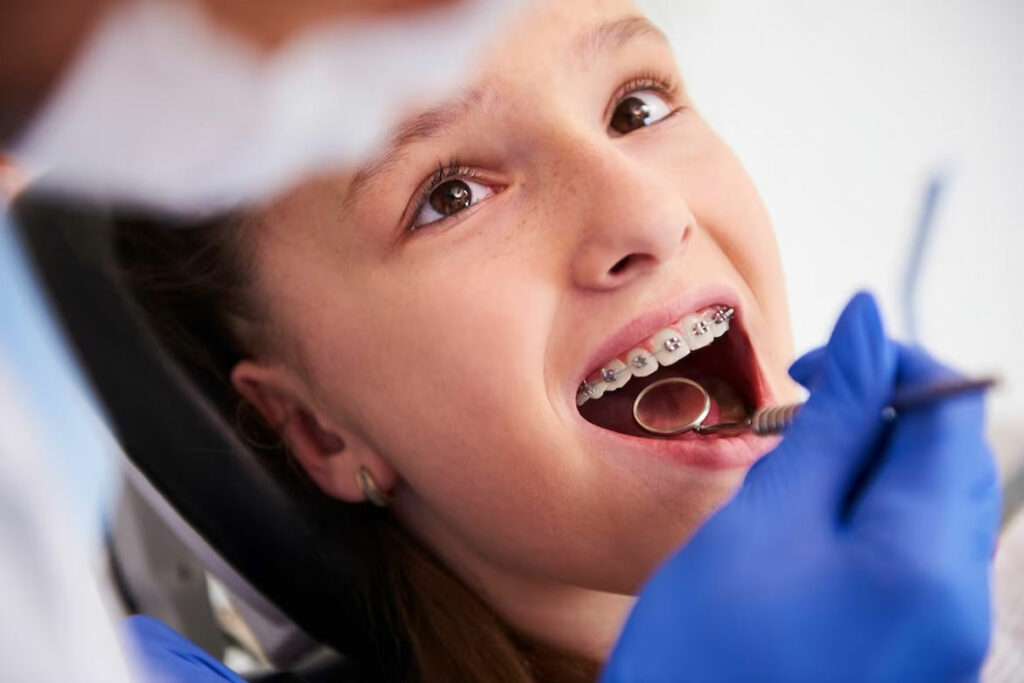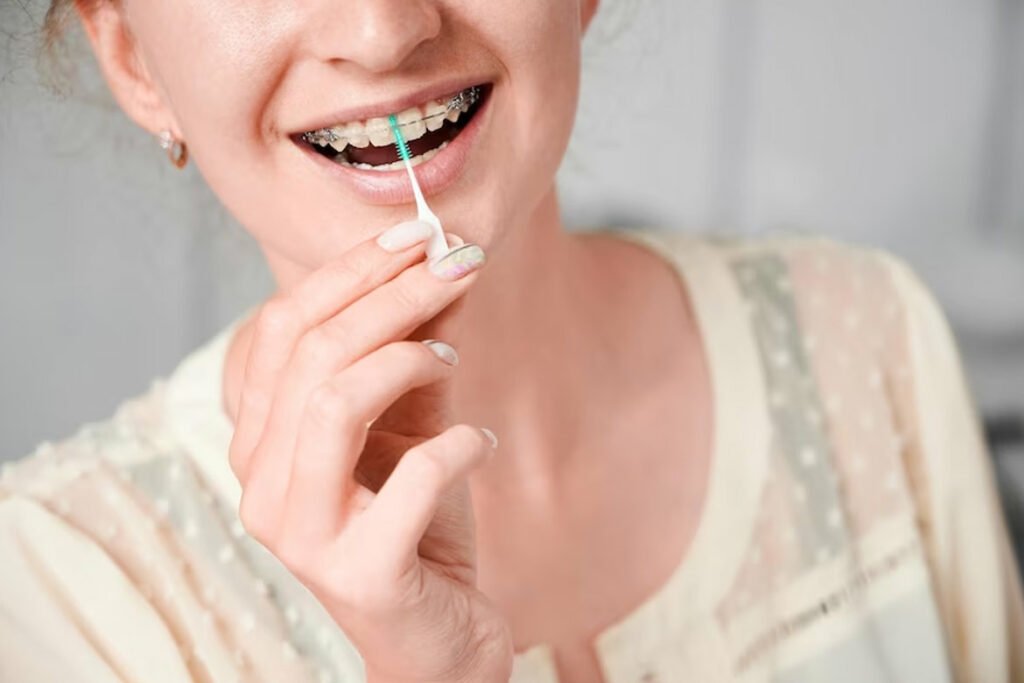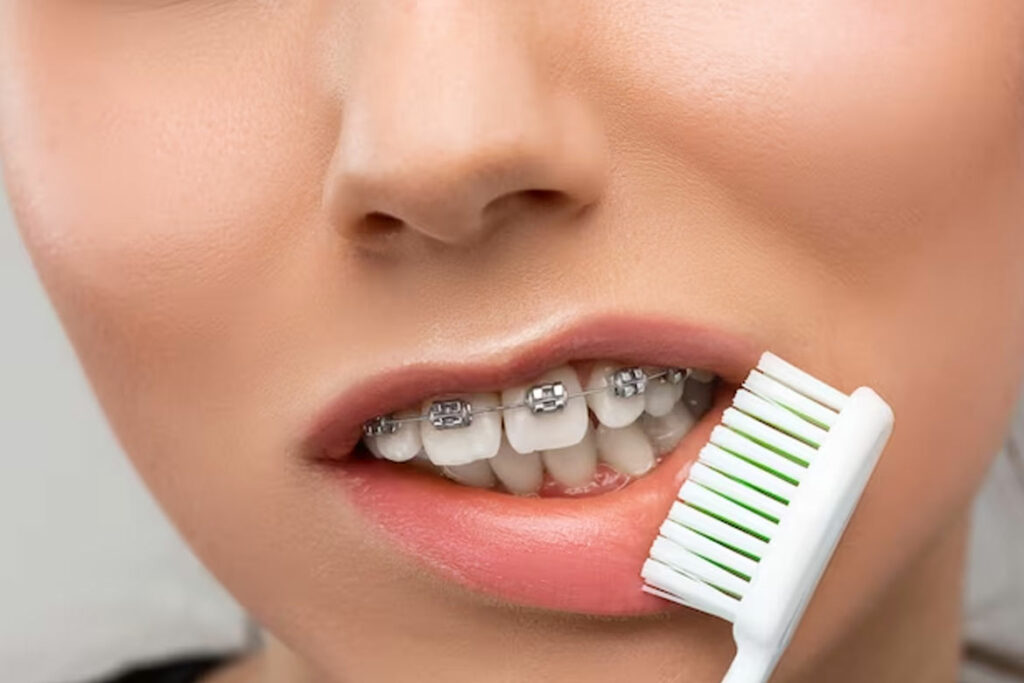Braces are dental appliances that are used to address crooked teeth, overbite, underbite, crossbite, gaps, and crowding. Braces operate by gradually moving teeth into the correct position by applying moderate pressure to the teeth. Braces can improve your smile, oral health, and self-esteem. Getting braces, on the other hand, is a huge decision that demands some planning and adjustment. Here are some things you should know before having braces, as well as some advice for after you get them.
Braces types:

There are various types of braces available today, each with their own set of benefits and drawbacks. The following are some of the most frequent types of braces:
Metal braces: These are the traditional braces that consist of metal brackets and wires that are attached to each tooth. Metal braces are the most noticeable, but also the most affordable and effective type of braces. You can customize your metal braces with colorful bands if you want to make them more fun.
Ceramic braces: These are similar to metal braces in shape and size, but they use tooth-colored or clear ceramic brackets that blend in more with your teeth. Some ceramic braces also use tooth-colored wires for a more discreet look. Ceramic braces are less noticeable than metal braces, but they are also more expensive and prone to staining.
Lingual braces: These are metal braces that are bonded to the back of your teeth, making them invisible from the front. Lingual braces are the most hidden type of braces, but they are also the most expensive and difficult to clean. They may also cause some discomfort and speech problems at first.
Self-ligating braces: These are braces that use special brackets that have a built-in clip or door that holds the wire in place, instead of elastic bands. Self-ligating braces are said to be more comfortable and faster than conventional braces, as they reduce friction and pressure on the teeth. They also require fewer adjustments and less maintenance.
Invisible braces: These are clear plastic aligners that fit over your teeth and gradually move them into alignment. Invisible braces are removable, which means you can take them out when you eat, drink, brush, or floss. They are also virtually invisible, which makes them ideal for people who want a discreet option. However, invisible braces are not suitable for everyone, as they can only treat mild to moderate cases. They are also more expensive and require more discipline than fixed braces.
Things You Must Know Before Getting Braces:

Before you get braces, there are some things you should do to prepare yourself and your teeth for the treatment. Here are some of them:
Have a checkup and cleaning done by your dentist:
One of the first things you should do before getting braces is to visit your dentist for a routine checkup and cleaning. This will help remove any plaque and tartar from your teeth and gums, as well as detect any cavities or other dental problems that need to be treated before getting braces. Ideally, you should also have a fluoride treatment done to strengthen your enamel and prevent tooth decay.
Complete any other dental work:
If you have any other dental issues that need to be addressed before getting braces, such as wisdom teeth removal, root canal treatment, fillings, crowns, or implants, you should get them done as soon as possible. This will prevent any complications or delays during your orthodontic treatment.
Start cutting troublesome foods out of your diet:
When you get braces, you will have to avoid certain foods that can damage your brackets and wires, or get stuck in them. These include hard foods (such as nuts, ice, popcorn kernels), sticky foods (such as gum, caramel, taffy), chewy foods (such as bagels, licorice), crunchy foods (such as chips, carrots), and sugary foods (such as candy, soda). It is better to start eliminating these foods from your diet before getting braces so that you can get used to it and avoid temptation later.
Make sure you clean your teeth very well before your appointment:

On the day of your appointment to get braces on, you should brush and floss your teeth very thoroughly to make sure they are clean and free of any food particles or debris. This will make it easier for your orthodontist to apply the braces and reduce the risk of infection.
Take a selfie:
Before you get braces, you may want to take a selfie of your smile to document your starting point. This way, you can compare your progress and see how much your teeth have changed over time. You can also share your before and after photos with your friends and family to show off your amazing transformation.
Take an over-the-counter pain reliever:
Getting braces can cause some soreness and discomfort in your mouth, especially during the first few days. To ease the pain, you can take an over-the-counter pain reliever, such as ibuprofen or acetaminophen, before or after your appointment. However, make sure to follow the dosage instructions and consult your doctor if you have any medical conditions or allergies.
Bring lip balm to your appointment:
When you get braces, your lips may become dry and chapped due to the prolonged exposure to air and metal. To prevent this, you should bring some lip balm with you to your appointment and apply it frequently throughout the day. This will help moisturize and protect your lips from irritation.
What Are the Don’ts After Getting Braces?

Read more: Brushing Teeth isn’t enough: Make your Teeth Stronger and Shiny with these 6 Foods
After you get braces, there are some things you should avoid doing to prevent any damage or complications. Here are some of them:
- Don’t eat foods that may cause damage to your braces:
You should avoid several foods after getting braces, as they can cause damage. This can include chewy, crunchy, or hard foods (such as nuts, ice, popcorn kernels), sticky foods (such as gum, caramel, taffy), chewy foods (such as bagels, licorice), crunchy foods (such as chips, carrots), and sugary foods (such as candy, soda). These foods can break or loosen your brackets and wires, or get stuck in them and cause plaque buildup. Instead, you should eat soft foods (such as yogurt, mashed potatoes, soup), cut your food into small pieces, and drink plenty of water.
- Don’t bite your nails or chew on pencils:
Do not bite any foreign object with your teeth – such as your nails or chewing on pencils. This can also damage your braces and harm your teeth. Moreover, biting your nails can introduce bacteria into your mouth and cause infections. If you have a habit of biting or chewing on things, you should try to find other ways to cope with stress or boredom, such as using a stress ball or chewing gum.
- Don’t miss your dental appointments:
After getting braces, you will need to visit your orthodontist regularly for adjustments and checkups. These appointments are essential for monitoring your progress and making sure everything is going smoothly. You should not miss or skip any appointments, as this can delay your treatment or cause problems. If you have any issues or concerns with your braces, you should contact your orthodontist as soon as possible.
- Don’t remove elastic bands:
Depending on your case, you may need to wear elastic bands along with your braces to help move your teeth into the correct position. These bands are attached to hooks on your brackets and create a force that aligns your bite. You should not remove these bands unless instructed by your orthodontist, as this can interfere with your treatment and prolong it. You should also replace them regularly and follow the directions on how to wear them correctly.
- Don’t drink carbonated or sugary drinks:
You should avoid drinking carbonated or sugary drinks after getting braces, as they can erode your enamel and cause tooth decay. These drinks can also stain your teeth and brackets, especially if you have ceramic braces. Instead, you should drink water or milk, which are good for your teeth and bones.
- Don’t self-adjust your braces:
You should never try to adjust your braces on your own, as this can cause serious damage to your teeth and braces. If you feel any discomfort or notice any problems with your braces, you should contact your orthodontist and let them handle it. They are trained and experienced in dealing with any issues that may arise during your treatment.
How to Care for Your Braces?

Read more: Wisdom tooth: What are the problems? How to alleviate pain?
Besides avoiding the things that can harm your braces, you should also follow some tips on how to care for your braces and keep them in good condition. Here are some of them:
Brush and floss regularly: As mentioned earlier, brushing and flossing are essential for maintaining your oral hygiene and preventing plaque buildup around your braces. You should brush your teeth after every meal, using a soft-bristled toothbrush and fluoride toothpaste. You should also floss at least once a day, using a floss threader or a water flosser to clean between your teeth and under the wires. You can also use an interdental brush or a proxabrush to clean around the brackets and wires.
Rinse with mouthwash: Rinsing with mouthwash can help remove any food particles or bacteria that may be left behind after brushing and flossing. It can also help prevent bad breath and keep your mouth fresh. You can use a fluoride mouthwash to strengthen your enamel and protect your teeth from decay, or an antibacterial mouthwash to reduce inflammation and infection in your gums.
Use dental wax: Dental wax is a soft material that you can apply over the brackets or wires that are causing irritation or discomfort in your mouth. It can help create a smooth surface and prevent rubbing or scratching of your lips, cheeks, or tongue. You can get dental wax from your orthodontist or a drugstore, and use it as needed throughout the day. Just make sure to remove it before brushing and replace it with a new piece afterwards.
Use a mouthguard: A mouthguard is a protective device that you can wear over your teeth and braces when playing sports or engaging in activities that may pose a risk of injury to your mouth. A mouthguard can help cushion the impact and prevent damage to your braces and teeth, as well as cuts or bruises to your lips, cheeks, or tongue. You can get a mouthguard from your orthodontist or a sporting goods store, and make sure it fits well and is comfortable to wear.
Visit the orthodontist regularly: Visiting the orthodontist regularly is important for monitoring your progress and making sure everything is going smoothly with your treatment. Your orthodontist will check your braces for any problems, adjust them as needed, and give you instructions on how to care for them. You should follow their recommendations and keep all your appointments, as this will help you achieve the best results in the shortest time possible.
Getting braces is a big step towards improving your smile and your oral health. However, it also requires some responsibility and commitment on your part. By following these tips on what to do and what not to do before and after getting braces, you can ensure that your treatment goes well and that you enjoy a healthy teeth.
